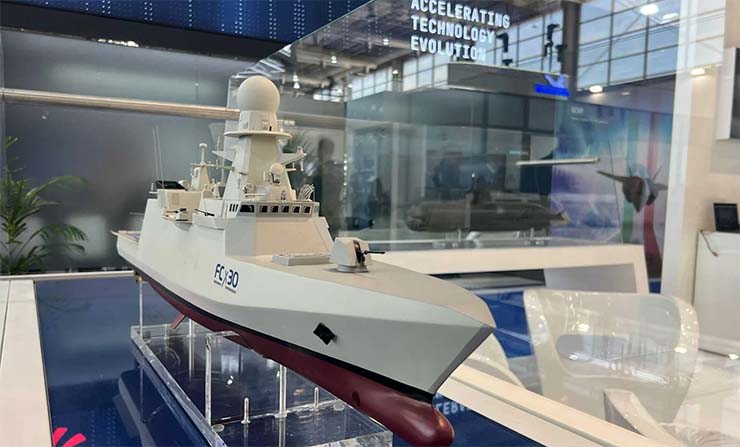
Riyadh: Italian shipbuilder Fincantieri has committed to build FCx30 multirole frigates in 32 months, an aggressive production timeframe that the company said is made possible by the introduction of a modular manufacturing approach involving the use of a digital twin and separating ship and mast building.
Based on Qatar’s Doha/Al Zubarah-class ship design, FCx30 vessels are to be offered to customers, including Saudi Arabia — regarded as a top sales priority — in three configurations: light, anti-submarine warfare (ASW) and full, according to a Fincantieri presentation at the World Defence Show here.
The modularity concept, driven by the FCx digital twin, a computerised version of the ship’s design, would be “fed real data” from the physical ship, once built, so engineers could optimise hardware and software, make use of artificial intelligence or potentially “rethink specs,” said Fincantieri CEO Pierroberto Folgiero.
A plan to build the FCx hull and mast in parallel means that testing of the ship’s combat management system, integrated on the mast, can start much earlier, compared to the more traditional and lengthier manufacturing process of integrating the mast after completion of the hull.
Folgiero said the modularity approach also shortens production time against a general frigate market trend of 40 months, and he “strongly believes” Saudi Arabia stands as a key “addressable market” to secure a future FCx30 sale.
“It’s not a long shot,” he said of that potential deal, while stressing that the company’s Riyadh office is ready to support a tender phase, should Saudi Arabia decide to call for a competitive frigate acquisition. He explained that it would be up to Saudi Arabian defence officials to speak about specific interest in a frigate acquisition program but that Riyadh has been open about “increasing naval capacity” generally, together with the 2030 Vision targeting 50 percent localization of defence spending in the Kingdom.
Fincantieri is working on an agreement with Sofon, Saudi Arabia’s new national shipbuilding authority. Sofon agreements are essential for international shipbuilders to be eligible for new naval contracts.
“[Sofon] will be the champion for the navy, and marine industry in Saudi Arabia. They have a huge shipbuilding [facility] in the east coast,” explained Ahmad Abdulaziz Al-Ohali, governor of the General Authority for Military Industries (GAMI). “We are working very closely with them, guiding them … [supporting their work with] international companies. Reputable international companies in the navy sector.”
Looking closer at the three modular design configurations of the FCx, the light version will cover search and rescue, constabulary, strike, counter-piracy, peacekeeping and maritime interception operations. An ASW configuration would encompass not only the anti-sub role, but also chemical, biological, radiological, nuclear, and high yield explosives and surveillance co-ordination. The full version of the frigate would address maritime strike coordination and reconnaissance and air interdiction of maritime targets.
Fincantieri has still to receive a firm FCx order, but the ship is also under consideration by Greece for the Hellenic Navy’s €1.5 billion ($1.58 billion) corvette program.
“Fincantieri remains interested in Greece,” said a company spokesperson in a statement. “We have presented the best corvette available on the market, a well proven and cutting edge model. […] We are waiting with great interest for further developments from the Greek government.”















